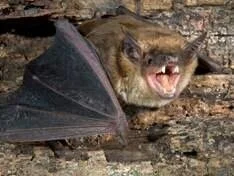Scratching sounds could be mice, squirrels, raccoons or…
none of the above!
Have you been hearing scratching and maybe some squeaking in your walls or coming from your attic? You may be tempted to throw a couple mouse traps up there and think you’ve taken care of things until you notice that the traps aren’t catching anything, and you’re still hearing the scratching and squeaking. Do you have a super smart mouse? A squeaky squirrel? Maybe. The more likely answer could be that you’ve got bats in your attic.
While we tend to categorize bats as nuisance wildlife or pests, bats are actually pretty great at pest control themselves, eating up to one third of their body weight in insects every night during spring, summer, and fall, including mosquitoes, beetles, ants, wasps and flies. In fact, bats are sometimes referred to as a “keystone” species, as they are essential to some of the tropical or desert environments they live in. In some areas, bats also pollinate and disperse the seeds of certain plants. Many bats here in PA live in caves or other natural protected spaces and while most migrate someplace warmer, some bats may decide to just crawl inside one of your vents or your chimney and set up winter quarters inside your house.
“Some people will tell you that you can remove a bat on your own, but we strongly advise that this is something that a homeowner should *never* attempt themselves. ”
Bats are a protected species, meaning that it’s illegal to interfere with a bat that is flying or hibernating, but when a bat is in your home, your health and the health of everyone in the home take precedence. It’s up to the homeowner to see that the bat/s are removed safely. The best and *safest* way to deal with a bat is to call a professional pest control service. Some people will tell you that you can remove a bat on your own, but we strongly advise that this is something that a homeowner should *never* attempt themselves. There are a few reasons for this. One, bat droppings, called guano, contain fungi that cause the lung disease histoplasmosis. You should never go near any accumulation of guano; but call a professional to disinfect the area and remove the droppings. Second, bats also carry bat mites and bat bugs which, despite their names, aren’t picky and will bite humans as well as bats. Finally, bats can also carry rabies, and if a bat is rabid, it can be transmitted through saliva or any contact at all. Do not engage with a bat, even if it seems to be injured or sick, as a grounded, helpless bat may be more likely to bite.
How can you prevent bats from coming inside your home in the first place? Same way you prevent mice, squirrels and birds from entering: seal up cracks and crevices and screen your chimneys and vents. When in doubt, an inspection of the exterior of your home for openings where bats can enter should be performed by a trained professional who can more easily spot likely entrance points and know how to eliminate them.
In short, bats are very beneficial, but dealing with a bat or bat colony in your home is tricky and can be, frankly, quite dangerous. Siani Pest Control has a trained and experienced wildlife tech on staff who can make sure that both the bat and your family are safe.


